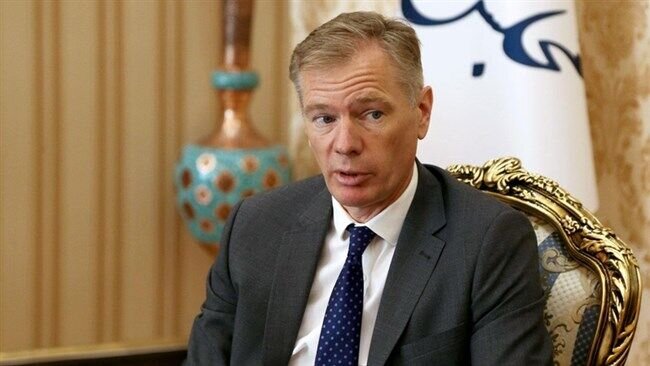Iran should sell its oil: British ambassador

TEHRAN - British Ambassador to Tehran Robert Macaire has said that Iran should sell its oil and Britain supports legitimate trade of Iran’s oil.
“We support legitimate trade of Iran’s oil and consider it a part of legitimate economic activities of Iran. We think Iran should be able to sell its oil and this issue should be told to the United States,” he told the Etemad daily in an interview published on Saturday.
He noted, “We have clearly said that we support the JCPOA [the 2015 nuclear deal] and removal of sanctions is a part of the JCPOA which makes it possible for Iran to sell its oil. This is our position which we have announced to the United States clearly.”
U.S. President Donald Trump withdrew Washington in May 2018 from the JCPOA, which was reached between Iran and six world powers in 2015.
Afterwards, Washington re-imposed sanctions on Iran that had been lifted under the deal and ordered new ones.
On April 22, the U.S. announced that Washington has decided not to extend waivers allowing the remaining importers to continue buying oil from Iran. The waivers ended on May 2.
On May 8, exactly one year after the U.S. withdrew from the multi-nation nuclear agreement, Iran announced a partial withdrawal from some aspects of the pact, saying that the country would no longer adhere to some of the limits on its nuclear activities. It also threatened to step up uranium enrichment if an agreement is not made within 60 days to protect it from the sanctions’ effects.
In follow-up to that deadline, on July 7 Iran announced that it has started enriching uranium to a higher purity than the 3.67% as the Europeans missed the 60-day deadline to devise a concrete mechanism to protect the country from the U.S. sanctions.
However, Iran has said if the remaining parties take concrete steps to shield the country from sanctions it will reverse its decisions.
‘Europeans make any effort to implement JCPOA’
Ambassador Macaire also said that the Europeans are making any effort to implement the JCPOA and make sure that Iran is gaining economic benefits of the deal.
INSTEX – the Instrument in Support of Trade Exchanges - is a European special purpose vehicle aimed at facilitating legitimate trade between Europe and Iran.
The European Union announced on June 28 that INSTEX has gone into effect.
Tehran says the mechanism is far short of Iran’s expectation. Iran insists the mechanism should include Iran’s oil purchases.
Majid Takht Ravanchi, Iran’s permanent representative to the United Nations, has likened INSTEX to a “beautiful car without gasoline”.
“The current situation of INSTEX does not suffice. This mechanism without money is like a beautiful car without gasoline,” he told reporters on June 29.
Secretary General of the European External Action Service (EEAS) Helga Schmid said on July 11 that countries outside the European Union will join INSTEX.
According to AP, she said that beyond the 10 EU nations that are already part of the system, she could “share with you that more, also non-EU member states, will join.”
Apart from the three EU member nations that are party to the deal - Britain, Germany and France - seven more EU member states have recently committed to take part.
France, Germany, and the UK, the three European parties to the JCPOA, issued a statement on July 14 reiterating their support for the deal.
Former British Foreign Minister Jeremy Hunt said that the nuclear deal is not dead “yet”.
According to the BBC, he said that there is a “small window” to save the nuclear deal.
Dutch Foreign Minister Stef Blok also said that “it is still not too late” to save the JCPOA.
French Foreign Minister Jean-Yves Le Drian said that Europe has to remain united in trying to preserve the nuclear deal.
“The Europeans have to stay united on this issue,” Reuters quoted Le Drian as saying.
Margot Wallstrom, Sweden’s foreign minister, said, “We will continue to talk to the Americans as well about how counterproductive this is and we’re not helped by further escalation of the sort of conflict between the U.S. and Iran.”
According to TASS, German Minister of State for Europe Michael Roth said, “Violating the nuclear agreement is completely unacceptable for us. As the European Union, we should speak with one voice on the matter.”
NA/PA
Leave a Comment